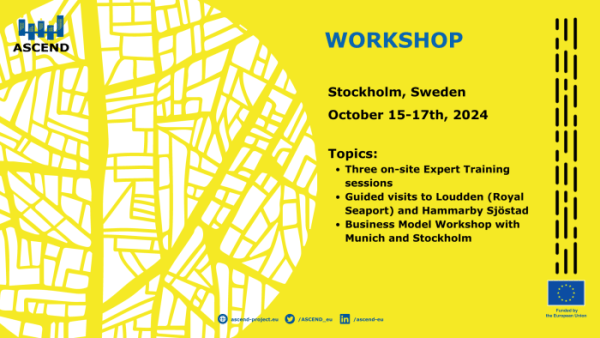
In the week from October 15 to 18, the ASCEND Lighthouse and Multiplier cities gathered for an impactful workshop jointly organised by Energy Cities and hosted by the city of Stockholm. The workshop focused on capacity building, featuring three expert training sessions as part of ASCEND’s Capacity Building Programme and multiple site visits.
During the first two days, participants explored three dynamic sites in Stockholm: the Loudden district, Royal Seaport, and Hammarby Sjöstad. Each location showcased innovative approaches to urban development and sustainability.
The Royal Seaport, currently Sweden's largest urban development area, is set to become a vibrant community with plans to build at least 12,000 new homes and 35,000 workplaces. This ambitious project is designed to integrate sustainable practices and smart urban solutions, transforming a former industrial area into a thriving neighbourhood. A significant part of this initiative includes Loudden, which aims to become a fossil fuel free district by 2030. This development involves extensive decontamination efforts to restore the site for future use.
Hammarby Sjöstad is internationally recognized as a model for sustainability. Since 2015, the sustainability efforts in this district have been propelled by the ElectriCITY Innovation initiative, which brings together residents, housing associations, businesses, authorities, and scientists. This collaborative approach has established new standards in ecological urban development, transforming what was once a neglected industrial area into a vibrant, eco-friendly community.
In addition to the site visits, participants were guided through the PCED Business Model Assembler, by Selena Lorenz and Monica Barosso from the University of St. Gallen Institute of Technology and Management. They took participants from the city of Stockholm, an ASCEND multiplier city, and Munich, a lighthouse city, through the various stages of developing a city solution. The playful aspect of the card game made it easier for participants to rethink the solutions from various stakeholders’ perspectives and create innovative models for city solutions that are adapted to their specific local context.
The Stockholm workshop was an invaluable opportunity for cities to connect face-to-face, build capacity, and exchange insights on developing sustainable and innovative urban solutions!
